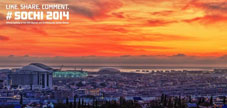Anticipating the Russian threat
By Messenger Staff
Wednesday, December 4




The idea is that Moscow is against such developments that lead to Georgia and the EU coming closer, so that presumably, Georgia is awaiting hard times.
When the Georgian Dream coalition headed by Bidzina Ivanishvili came to power a year ago, it promoted a thesis on regulating relations with the Russian Federation.
Georgia took certain steps in this direction. For example, the Georgian leadership changed the aggressive rhetoric of the previous leadership into a moderate, balanced and diplomatic language. Tbilisi publicly announced that Georgia would not boycott the Sochi Olympic Games and its sportsmen would take part in it.
The Georgian Dream assigned Zurab Abashidze as a special envoy in relations with Russia. Tbilisi showed its goodwill to improve relations with Moscow.
Unfortunately, the Kremlin did not respond adequately. And this has given birth to a certain disappointment and frustration in the Georgian political spectrum and even in the Georgian Dream administration.
Although the major reason for irritation for Moscow, the former President of Georgia Mikheil Saakashvili, has left the political scene, Georgia did not change its direction in foreign relations. Its strive to integrate with the EU and NATO remains on the agenda but this is unacceptable for the Kremlin.
Russian President Vladimir Putin’s dream is to revive the Soviet Union under a new name by attracting and mostly forcing the former Soviet member states to join its possible amalgamation. Therefore, Moscow, wants to fulfill its plans using any way possible.
It did not have much trouble attracting Belarus to join the Customs Union and presumably the Eurasian Union. Its next target was Armenia. Here the Kremlin brought the Karabakh issue out on the discussion table and promised to provide military support to Yerevan in the case of a repeated war with Azerbaijan. Thus, Russia received Armenia’s commitment to join the Customs and Eurasian Unions.
Russia’s “triumphal” steps continued in regards to Ukraine. At the very last moment under Moscow’s pressure, Kiev withdrew from the process of signing the association agreement with the EU.
Next comes Azerbaijan. It is not yet clear what Moscow’s promise to Baku will sound like, but the latter has already expressed its position on special conditions for EU-Azerbaijani relations.
During his recent visit to Yerevan, Russian President Putin openly announced that Russia is not going to give up the Caucasus region. On the contrary, he highlighted that Moscow wants to further reinforce its presence in the region.
Now Georgia is the final pocket of resistance. Moscow has a wide range of weapons to use towards Tbilisi, starting from closing the Russian market for Georgian businesses followed by provocations like the current procedure of installing barbed wire fences along the de facto administrative border separating the Georgian mainland from its breakaway regions.
Of course, even the provocations and military confrontations are not excluded. In this case, no initialing or being an aspirant country for the NATO membership will help Georgia to protect its positions.
Meanwhile Tbilisi is doing its best not to be provoked and trapped. The country still continues its cautious politics either in the wording towards Russia’s conduct or by its actions.
Many analysts suggest that relations with the northern neighbor will become more strained when the Sochi Olympic Games will be over. Some even predict that the Kremlin might impose yet another embargo on Georgian products.
There is also a great deal of speculation in Georgia that Moscow will continue supporting pro-Russian forces inside Georgia.
